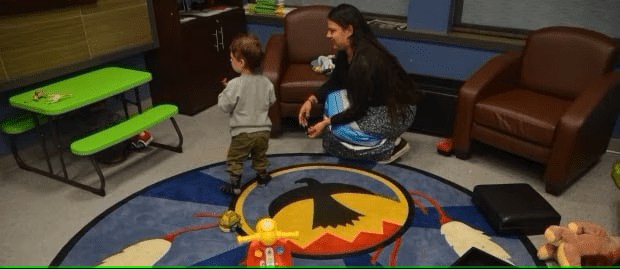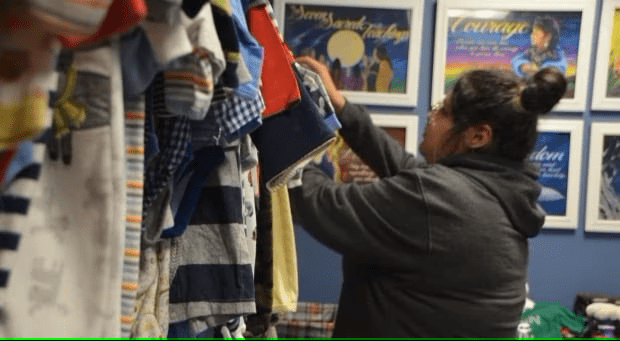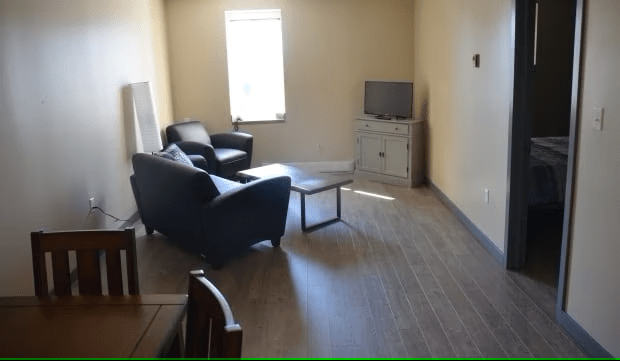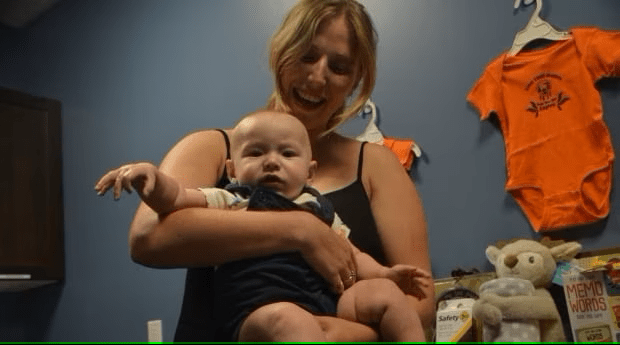Providing Indigenous moms with clothes, housing and whatever they need to 'hit the ground running
This is the first in a three-part series on the Indigenous child welfare system in northern Ontario
Erik White - CBC News
Posted: December 11, 2023
The Nogdawindamin neonatal hub in downtown Sault Ste. Marie aims to help women look after their babies so that they don't end up on the radar of child welfare officials. 1:01
Holding her baby son Ezra, Emily Giovagnoli feels like a different person than she was a year ago.
"My life consisted of waking up, getting high. How am I going to get high? How am I going to get money? What am I going to do?" said the 26-year-old Sault Ste. Marie, Ont. woman.
"And I was totally selfish, so thinking of, 'Now I have to take care of someone else when all I want to do is take care of myself, and I can't even take care of myself.'"
Finding out that she was pregnant helped her shake loose the grip of fentanyl that had her sleeping in her car and couch surfing for seven years.
"My son pretty much saved my life. I know a lot of people say that, but he really did," Giovagnoli said.

She also feels saved by the staff at the neonatal hub in downtown Sault Ste. Marie, run by Nogdawindamin Family and Community Services, who supported her through her pregnancy and continue to help her as she plans for the future.
While it is a children's aid agency and does sometimes have to apprehend children from troubled families, the hub is part of the prevention arm of the organization that is trying to keep Anishinaabe kids with their mothers and connected to their culture.
"We want to make sure that they're ready for the baby and they're ready to just hit the ground running and with our support, we can keep child welfare at bay," said Carli Ochman, one of the outreach workers.

The neonatal hub does that in several different ways.
That includes providing maternity and baby clothing to new and expectant moms, as well as lending out strollers and cribs and other baby essentials.
There is also an area at the hub called the Binoogiins— which means "baby" in Ojibwe— Boutique, where diapers, shampoo and a range of other items are available.
But Ochman says the "catch" is that the mothers have to earn "binoogiins bucks" to spend in the boutique by participating in the programs at the hub, including cultural sessions, and "basically anything that is taking a step in the right direction."

"Even if mom just wants to get her nails done. She's put the work in," Ochman said.
The hub also has "cuddlers" on staff, who can sit with the babies while their mothers are meeting with outreach workers or just taking a break.
And upstairs at the hub off Queen Street in downtown Sault Ste. Marie, there are two transitional housing units where clients are able to stay for free.
"Some of them don't know how to do dishes. Some of them don't know how to cook. Some of them don't know to sweep the floor," said Brandi Bradley, Nogdawindamin's neonatal services manager.
"Sometimes we hold their hand for a little while and then we let go and if we need to re-hold their hand, we'll do it again."

Bradley says "it's really exciting" when the women are ready to move out of the apartments upstairs and get a place of their own.
Ochman remembers a woman who came to them near the start of the pandemic with no identification and no income, who needed to "immediately" leave the situation she was in.
"Again, that's an example of keeping child welfare away. We were able to give her a safe space to bring her child," she said.
"She just needed that fresh start."
- Anishinabek Nation 'seen as a leader' in creating Indigenous child welfare system
- The road to reconciliation: where we're at with the calls to action in northern Ontario
Emily Giovagnoli knows the feeling.
After getting clean when she found out she was pregnant, last year she had what she calls "a slip" and ended up getting high with an ex-boyfriend.
"It was the worst feeling in the world, because by then I was totally in love with my baby," she said.
And then with every ultrasound, she was worried she would find out her son had been affected by that injection of fentanyl and was similarly "terrified" that when she gave birth, that children's aid workers would be there to take Ezra away.
But that didn't happen and Giovanogli credits the help of the neonatal hub.

"When I did see him it was like the best feeling in the world," she said.
Giovanogli isn't Indigenous, but eight-month-old Ezra is and that's one of the reasons she keeps coming around the neonatal hub, which has helped him stay connected to his culture including a cedar bath and a naming ceremony where he was dubbed: "small fast moving spirit."
"It's his choice when he gets older, but I'm going to continue bringing him around," she said.
